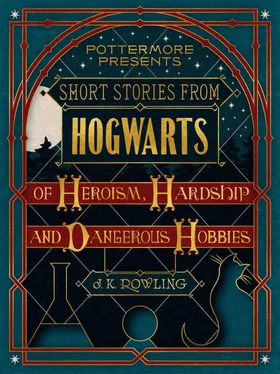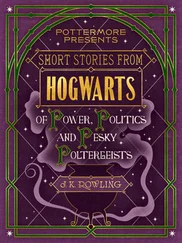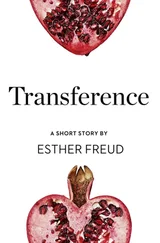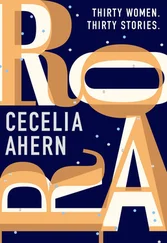School Career
As is often the case where the young witch or wizard comes from a family who has struggled with its magical identity, Hogwarts was, for Minerva McGonagall, a place of joyful release and freedom.
Minerva drew unusual attention to herself on her very first evening, when she was revealed to be a Hatstall. After five and a half minutes, the Sorting Hat, which had been vacillating between the houses of Ravenclaw and Gryffindor, placed Minerva in the latter. (In later years, this circumstance was a subject of gentle humour between Minerva and her colleague Filius Flitwick, over whom the Sorting Hat suffered the same confusion, but reached the opposite conclusion. The two Heads of House were amused to think that they might, but for those crucial moments in their youths, have exchanged positions).
Minerva was quickly recognised as the most outstanding student of her year, with a particular talent for Transfiguration. As she progressed through the school, she demonstrated that she had inherited both her mother’s talents and her father’s cast-iron moral sense. Minerva’s school career overlapped by two years with that of Pomona Sprout, later Head of Hufflepuff House, and the two women enjoyed an excellent relationship both then, and in later years.
By the end of her education at Hogwarts, Minerva McGonagall had achieved an impressive record: top grades in O.W.L.s and N.E.W.T.s, Prefect, Head Girl, and winner of the Transfiguration Today Most Promising Newcomer award. Under the guidance of her inspirational Transfiguration teacher, Albus Dumbledore, she had managed to become an Animagus; her animal form, with its distinctive markings (tabby cat, square spectacles markings around eyes) were duly logged in the Ministry of Magic’s Animagus Registry. Minerva was also, like her mother, a gifted Quidditch player, although a nasty fall in her final year (a foul during the Gryffindor versus Slytherin game which would decide the Cup winner) left her with concussion, several broken ribs and a lifelong desire to see Slytherin crushed on the Quidditch pitch. Though she gave up Quidditch on leaving Hogwarts, the innately competitive Professor McGonagall later took a keen interest in the fortunes of her house team, and retained a keen eye for Quidditch talent.
Early Heartbreak
Upon graduation from Hogwarts, Minerva returned to the manse to enjoy one last summer with her family before setting out for London, where she had been offered a position at the Ministry of Magic (Department of Magical Law Enforcement). These months were to prove some of the most difficult of Minerva’s life, for it was then, aged only eighteen, that she proved herself truly her mother’s daughter, by falling head-over-heels in love with a Muggle boy.
It was the first and only time in Minerva McGonagall’s life that she might have been said to lose her head. Dougal McGregor was the handsome, clever and funny son of a local farmer. Though less beautiful than Isobel, Minerva was clever and witty. Dougal and Minerva shared a sense of humour, argued fiercely, and suspected mysterious depths in each other. Before either of them knew it, Dougal was on one knee in a ploughed field, proposing, and Minerva was accepting him.
She went home, intending to tell her parents of her engagement, yet found herself unable to do so. All that night she lay awake, thinking about her future. Dougal did not know what she, Minerva, truly was, any more than her father had known the truth about Isobel before they had married. Minerva had witnessed at close quarters the kind of marriage she might have if she wed Dougal. It would be the end of all her ambitions; it would mean a wand locked away, and children taught to lie, perhaps even to their own father. She did not fool herself that Dougal McGregor would accompany her to London, while she went to work every day at the Ministry. He was looking forward to inheriting his father’s farm.
Early next morning, Minerva slipped from her parents’ house and went to tell Dougal that she had changed her mind, and could not marry him. Mindful of the fact that if she broke the International Statute of Secrecy, she would lose the job at the Ministry for which she was giving him up, she could give him no good reason for her change of heart. She left him devastated, and set out for London three days later.
Ministry Career
Though undoubtedly her feelings for the Ministry of Magic were coloured by the fact that she had recently suffered an emotional crisis, Minerva McGonagall did not much enjoy her new home and workplace. Some of her co-workers had an engrained anti-Muggle bias that, given her adoration of her Muggle father, and her continuing love for Dougal McGregor, she deplored. Though a most efficient and gifted employee, and fond of her much older boss, Elphinstone Urquart, Minerva was unhappy in London, and found that she missed Scotland. Finally, after two years at the Ministry, she was offered a prestigious promotion, yet found herself turning it down. She sent an owl to Hogwarts, asking whether she might be considered for a teaching post. The owl returned within hours, offering her a job in the Transfiguration department, under Head of Department, Albus Dumbledore.
Friendship with Albus Dumbledore
The school greeted Minerva McGonagall’s return with delight. Minerva threw herself into her work, proving herself a strict but inspirational teacher. If she kept letters from Dougal McGregor locked in a box under her bed, this was (she told herself firmly) better than keeping her wand locked there. Nevertheless, it was a shock to learn from the oblivious Isobel (in the middle of a chatty letter of local news) that Dougal had married the daughter of another farmer.
Albus Dumbledore discovered Minerva in tears in her classroom, late that evening, and she confessed the whole story to him. Albus Dumbledore offered both comfort and wisdom, and told Minerva some of his own family history, previously unknown to her. The confidences exchanged that night between two intensely private and reserved characters were to form the basis of a lasting mutual esteem and friendship.
Minerva McGonagall was one of only a handful of people who knew, or suspected, how dreadful a moment it was for Albus Dumbledore when, in 1945, he made the decision to confront and defeat the Dark wizard Gellert Grindelwald.
Voldemort’s First Rise
Minerva McGonagall did not teach the young Tom Riddle, but she was privy to Dumbledore’s fears and suspicions about him. Minerva was not inducted into the Order of the Phoenix during Voldemort’s first climb to power (at that time the Order of the Phoenix was seen as a renegade outfit by the Ministry; successive Ministers feared Dumbledore’s charisma and magical talent, and were inclined to harbour fears that he wished to succeed them). Minerva’s abilities as an Animagus were to prove useful in these dark periods of wizarding history, however, and unbeknownst to her students she spent many nights spying for the Ministry in the guise of a tabby cat, bringing the Aurors crucial information on the activities of Voldemort’s followers.
Like most of the magical community she suffered personal bereavements during the first period of Voldemort’s power. Among the worst were the loss of her brother, Robert; two of her favourite students, Lily Evans and James Potter; and Dougal McGregor, who was murdered, along with his wife and children, in a random anti-Muggle attack by the Death Eaters. This last news was a terrible blow to Minerva, who asked herself whether she might not have been able to save Dougal’s life had she married him.
Marriage
Through all her early years at Hogwarts, Minerva McGonagall remained on terms of friendship with her old boss at the Ministry, Elphinstone Urquart. He came to visit her while on holiday to Scotland, and to her great surprise and embarrassment, proposed marriage in Madam Puddifoot’s teashop. Still in love with Dougal McGregor, Minerva turned him down.
Читать дальше












